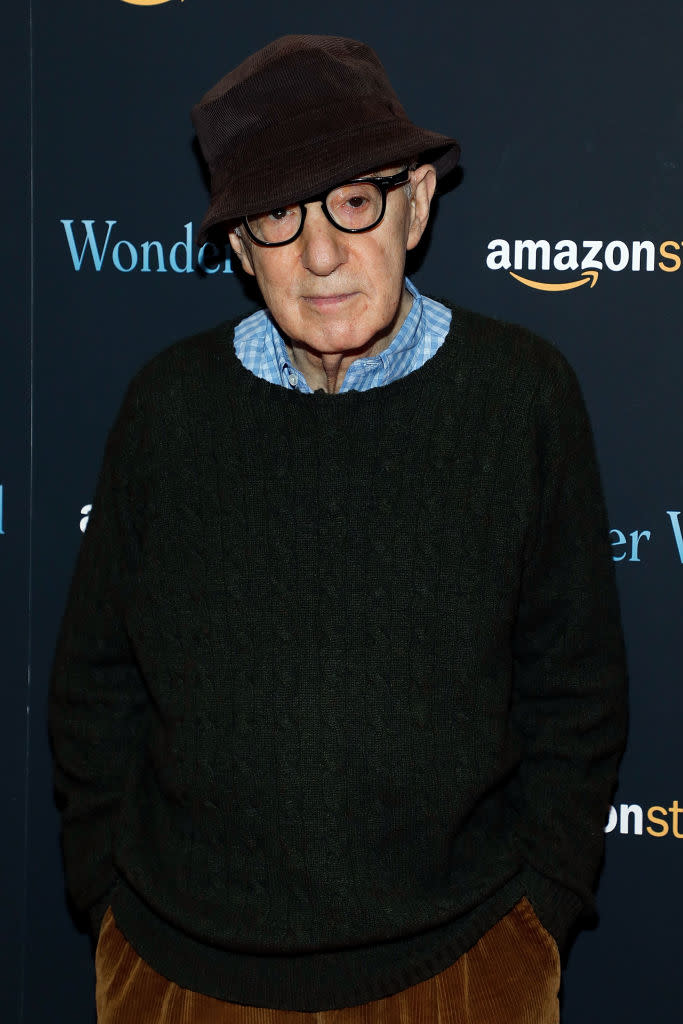Woody Allen has a 'vivid obsession with young women and girls,' researcher says

Woody Allen is such a prolific filmmaker that few people will ever see all his movies. Even fewer will take the time to dip into the 56 boxes comprising his personal archive, including drafts and other writings from more than 50 years in the entertainment industry, stored at Princeton University’s Firestone Library since 1980. Writer Richard Morgan did one better, and read the archives from beginning to end — the first person to do so, the library told him — and was left with one disturbing conclusion: Allen has “an insistent, vivid obsession with young women and girls.”
Writing in the Washington Post, Morgan cites several examples of Allen’s offscreen preoccupation. Many of them are not unlike what Allen has shown onscreen in such films as Manhattan, released in 1979, in which his 42-year-old character is in a relationship with a 17-year-old girl, played by Mariel Hemingway.
“Allen, quite simply, drips with repetitious misogyny,” Morgan writes. “Allen, who has been nominated for 24 Oscars, never needed ideas besides the lecherous man and his beautiful conquest.”
In the “Woody Papers,” Morgan writes, he found numerous other mentions of young women:
— “In a draft of a 1977 New Yorker story called ‘The Kugelmass Episode,’ is a 45-year-old fascinated by ‘coeds’ at City College of New York. In the margin next to this character’s dialogue, Allen wrote, then crossed out, ‘c’est moi’ — it’s me.”
— “But behold how quickly his writing veers in a draft of ‘My Apology,’ a short story: ‘Of all the famous men who ever lived, the one I would most like to have been was Socrates. Not just because he was a great thinker, because I have been known to have some reasonably profound insights myself, although mine invariably revolve around two 18-year-old cocktail waitresses and some rope handcuffs.’”
— “In ‘Rainy Day,’ Roland Polland, a fictional film director, confesses to a young female college student, ‘I took no risks because the b**** goddess of success opened her legs in my brain.’ But that’s Roland Polland. Not Woody Allen. The ‘c’est moi’ is always crossed out. He is Alvy Singer. He is Moses Rifkin. He is Isaac Davis. He is Sandy Bates. He is Zelig.”
Morgan cites an unmade screenplay from the ’60s or ’70s, titled The Filmmaker, co-written by Allen. It follows a documentarian named Woody Allen who’s already in a relationship with a woman, but falls in love with “a girl” with schizophrenia that he meets while filming at a mental institution. Morgan notes that the Woody Allen character is 53, while the object of his desire, whom he ends up sending a valentine and asking to meet for a martini, is 17.
“There’s nothing criminal about an 82-year-old’s fixation with 18-year-olds, and it’s not whip-out-your-penis, button-under-the-desk bad,” Morgan posits. “But it’s deeply, anachronistically gross. More than that, he seems not to care about bettering or changing himself in any way. He lives and thinks and creates as he did in the 1970s, nearly a half-century ago. He’s a reminder that our future, however woke it becomes, will not be full of social justice valedictorians quoting James Baldwin and Roxane Gay. There will be 22nd-century dunces lagging by a half-century or more. Allen is worse than an augury of those trolls of tomorrow; he is a model for them, a validation.”
The writer adds, “All art is partly autobiographical — it comes from inside someone’s mind, inside their soul. Allen’s archive shows what is inside his.”
Of course, Allen has long caused controversy for his relationships with women. The writer and director infamously married ex-wife Mia Farrow’s adopted daughter Soon-Yi Previn, following an affair that began when the 35-years-younger Previn was in college. Dylan Farrow, an adopted daughter Allen shares with Farrow, has alleged that Allen sexually abused her as a child in 1992. The claim is one that, over the decades, she has stood by just as fiercely as Allen has denied that such a thing ever happened. He has always maintained his innocence.
Just last month, Dylan penned a column for the Los Angeles Times, asking why Allen has been largely unaffected by the #MeToo movement sweeping Hollywood and, well, the world. “The revolution has been selective,” she wrote.
Read more from Yahoo Lifestyle:
Hoda Kotb offers some confidence-boosting New Year’s inspiration
Trump’s ‘Most Dishonest and Corrupt Media Awards’ has a red carpet host: Chrissy Teigen
‘Riverdale’ accused of sexualizing teen girls for pole dance scene
Follow us on Instagram, Facebook, and Twitter for nonstop inspiration delivered fresh to your feed, every day.


